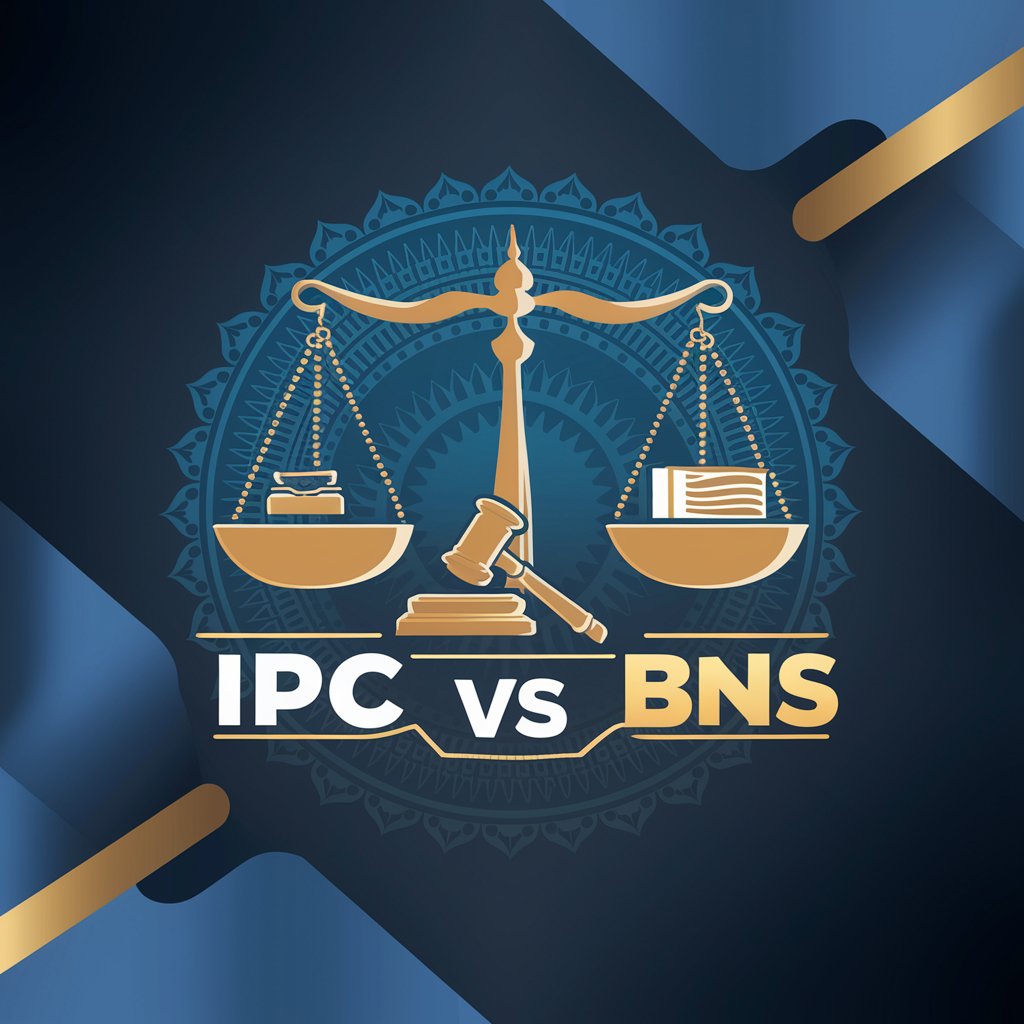IPC vs BNS - IPC and BNS Comparison

Hello! Need help comparing IPC with BNS? Let's dive into the details!
Navigate Indian Penal Law with AI
Compare the Indian Penal Code section 302 with its equivalent in the Bharatiya Nyaya Sanhita...
Identify the key differences between IPC section 375 and its counterpart in the BNS...
How has the definition of criminal conspiracy changed from IPC to BNS...
Explain the changes in punishment for theft from the IPC to the BNS...
Get Embed Code
Introduction to IPC vs BNS
IPC vs BNS is designed to provide a detailed mapping and comparison between the Indian Penal Code (IPC) and the Bharatiya Nyaya Sanhita (BNS). Its primary purpose is to assist legal professionals, scholars, and anyone interested in the transition from the IPC to the BNS in understanding the changes, deletions, or new introductions in the legal framework. For instance, IPC's section on 'Theft' has counterparts in BNS with adjustments in definitions and penalties, reflecting the evolution in legal thinking and societal needs. Powered by ChatGPT-4o。

Main Functions of IPC vs BNS
Comparative Analysis
Example
Comparing IPC's sections on 'Punishments' with BNS's revamped sections, illustrating differences in legal approach towards crime and punishment.
Scenario
A legal scholar researching the evolution of penal laws in India uses IPC vs BNS to understand how punitive measures have transformed.
Legal Reference
Example
Providing references for IPC sections dealing with 'Public Nuisance' and their equivalent in BNS, highlighting changes in legal definitions.
Scenario
A public prosecutor references IPC vs BNS to prepare for a case involving charges of public nuisance under the new BNS framework.
Educational Tool
Example
Utilizing IPC vs BNS for academic purposes, such as teaching law students about the transition from IPC to BNS, using specific sections like 'Rape' and 'Murder' to illustrate changes.
Scenario
A law professor uses IPC vs BNS as a curriculum resource to teach students about the nuances and updates in criminal laws under BNS compared to IPC.
Ideal Users of IPC vs BNS Services
Legal Professionals
Lawyers, judges, and public prosecutors who need to understand the updated legal framework under BNS for effective litigation and judgment.
Academic Researchers
Scholars and students in legal studies interested in comparative law analysis, particularly in the evolution of penal codes from IPC to BNS.
Policy Makers
Government officials and policy makers involved in the drafting, analysis, and implementation of legal statutes, who require a deep understanding of the changes BNS introduces.

Usage Guidelines for IPC vs BNS
1
Begin by accessing yeschat.ai for an immediate trial, bypassing the need for login and without the necessity for a ChatGPT Plus subscription.
2
Upload or input the specific IPC section you are interested in. Ensure you have the exact section number or related keywords ready.
3
Review the summarized comparison provided between the IPC section and its BNS counterpart, focusing on similarities, differences, and any legal implications.
4
Utilize the detailed comparison for legal research, drafting, or academic purposes. The tool's insights can help in understanding the evolution from IPC to BNS.
5
For complex inquiries or deeper legal analysis, consider using the tool's advanced search to explore multiple sections or to compare broader legal concepts between IPC and BNS.
Try other advanced and practical GPTs
VS für Dummies
Demystifying distributed systems, one explanation at a time.

Coin VS
Empowering Your Crypto Journey with AI

Suárez VS Lewandowski
Unveil soccer legends with AI insight

Philosopher Nietzsche vs. Sopenhauer
Debating Philosophy, AI-Powered

Gold vs Silver Ratio
Track Precious Metals, Powered by AI

Science vs religion vs art
Explore, debate, and learn with AI

Russia vs Ukraine war
AI-powered Insight into the Russia-Ukraine Conflict

クレーマークレーマー:Kramer vs. Kramer
Empowering Your Voice with AI

$ vs 원
Your AI-powered guide to USD/KRW trends

Cats vs Dogs
Proving cats' superiority with wit and humor.

VS Code Hotkey Helper
Streamline your coding with AI-powered shortcuts.

Parents vs Guardians
Empowering guardianship decisions with AI-powered legal insights.

Frequently Asked Questions about IPC vs BNS
What is IPC vs BNS?
IPC vs BNS is a specialized tool designed to compare sections of the Indian Penal Code (IPC) with their counterparts or relevant sections in the Bharatiya Nyaya Sanhita (BNS), highlighting differences, deletions, or new introductions.
How can IPC vs BNS assist legal professionals?
Legal professionals can use IPC vs BNS for accurate legal research, understanding changes in penal laws, preparing for cases by comparing IPC and BNS laws, and staying updated with the transition in Indian penal legislation.
Are there any new offences introduced in BNS not present in IPC?
Yes, BNS introduces several new offences and legal concepts not previously covered in IPC. IPC vs BNS provides a comprehensive comparison, helping users to identify these new introductions effectively.
Can IPC vs BNS help in academic research?
Absolutely. Scholars and students can utilize IPC vs BNS for thesis research, academic papers, or to understand the evolution and differences in Indian penal laws over time, aiding in comprehensive legal studies.
Is IPC vs BNS updated with the latest legal amendments?
IPC vs BNS is regularly updated to reflect the latest legal amendments and changes in both IPC and BNS, ensuring users have access to current and relevant legal comparisons.
